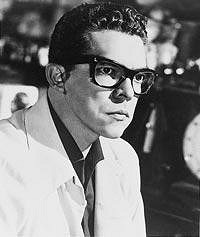Tiki Central / Tiki Music / Juan García Esquivel
Post #442997 by Zeta on Fri, Mar 27, 2009 2:34 PM
|
Z
Zeta
Posted
posted
on
Fri, Mar 27, 2009 2:34 PM
Here we will post everything about the Mexican master also known as "The King of Space Age Pop" Background information Juan García Esquivel (January 20, 1918 – January 3, 2002) often simply known as Esquivel!, was a Mexican band leader, pianist, and film score composer. He's known today mostly for creating unique jazz and lounge music. Esquivel is sometimes called "The King of Space Age Pop" and "The Busby Berkley of Cocktail Music". Esquivel is considered one of the foremost exponents of a style of late 1950s-early 1960s quirky instrumental pop that became known (in retrospect) as "Space Age Bachelor Pad Music". He was born in Tampico, Tamaulipas, and his family moved to Mexico City in 1928 where he studied at the UNAM.
[edit] Music Esquivel is considered the king of a style of late 1950s-early 1960s quirky instrumental pop known today as Lounge music. Esquivel's musical style was highly idiosyncratic, and although elements sound like his contemporaries, he had many stylistic tics that distinguished his music and made it instantly recognizable, including exotic percussion, wordless vocals, virtuoso piano runs, and exaggerated dynamic shifts in volume. He used many jazz-like elements, but other than his piano solos, there is no improvisation and the works are tightly, meticulously, even perfectionistically arranged by Esquivel himself. His orchestration tended toward the very lush; he combined an orchestra, his own heavily-ornamented piano style, a mixed chorus, and a long list of novel instruments, such as Chinese bells, mariachi bands, whistling, and numerous percussion instruments. The chorus was often called upon to sing only nonsense syllables, most famously "zu-zu" and "pow!" A survey of Esquivel's recordings reveals a fondness for glissandi, sometimes on a half-valved trumpet, sometimes on a kettle drum, but most frequently on pitched percussion instruments and slide guitars. Esquivel's use of stereo recording was legendary, occasionally using two bands recording simultaneously in separate studios, such as on his album Latin-Esque (1962). The song "Mucha Muchacha" makes particularly mind-bending use of the separation, with the chorus and brass rapidly alternating sides. He arranged many traditional Mexican songs like "Bésame Mucho","La Bamba","El Manisero" (Cuban/Mexican) and "La Bikina"; also Brazilian songs like "Aquarela do Brasil" (also known simply as "Brazil"),"Surfboard" and "Agua de Beber", and composed spicy lounge-like novelties such as "Mini Skirt","Yeyo","Latin-Esque","Mucha Muchacha" and "Whatchamacallit". He was commissioned to compose the music of a Mexican children's TV show Odisea Burbujas. His concerts also featured elaborate light shows, years before effects like that became popular in live music. He performed in Las Vegas on several occasions, often as the opening act for Frank Sinatra. Several compilations of Esquivel's music were issued starting with Space Age Bachelor Pad Music in 1994. The apparent success of these releases led to reissues of several of Esquivel's albums. The first reissues were compiled by Irwin Chusid, who also produced the first CD reissues of Raymond Scott and The Langley Schools Music Project. The last recording Esquivel worked on was Merry Christmas from the Space-Age Bachelor Pad in 1996, for which he did a voiceover on a track by the band Combustible Edison, as well as including several obscure tracks from his past sessions. The last CD released during his lifetime, See It In Sound, was actually recorded in 1960, but was not released at the time because the record company considered it wasn't commercial enough. When finally released in 1998, it exhibited very unusual and introspective stylings absent from his other works, including a version of "Brazil" which is played as a musical soundscape of a man bar-hopping, and the band playing different renditions of "Brazil" at each bar. [edit] Influences Kronos Quartet recorded a string quartet arrangement of Esquivel's song "Mini Skirt" for their album Nuevo. [edit] Discography
[edit] See also
[edit] External links
Retrieved from "http://en.wikipedia.org/wiki/Juan_Garc%C3%ADa_Esquivel" |

